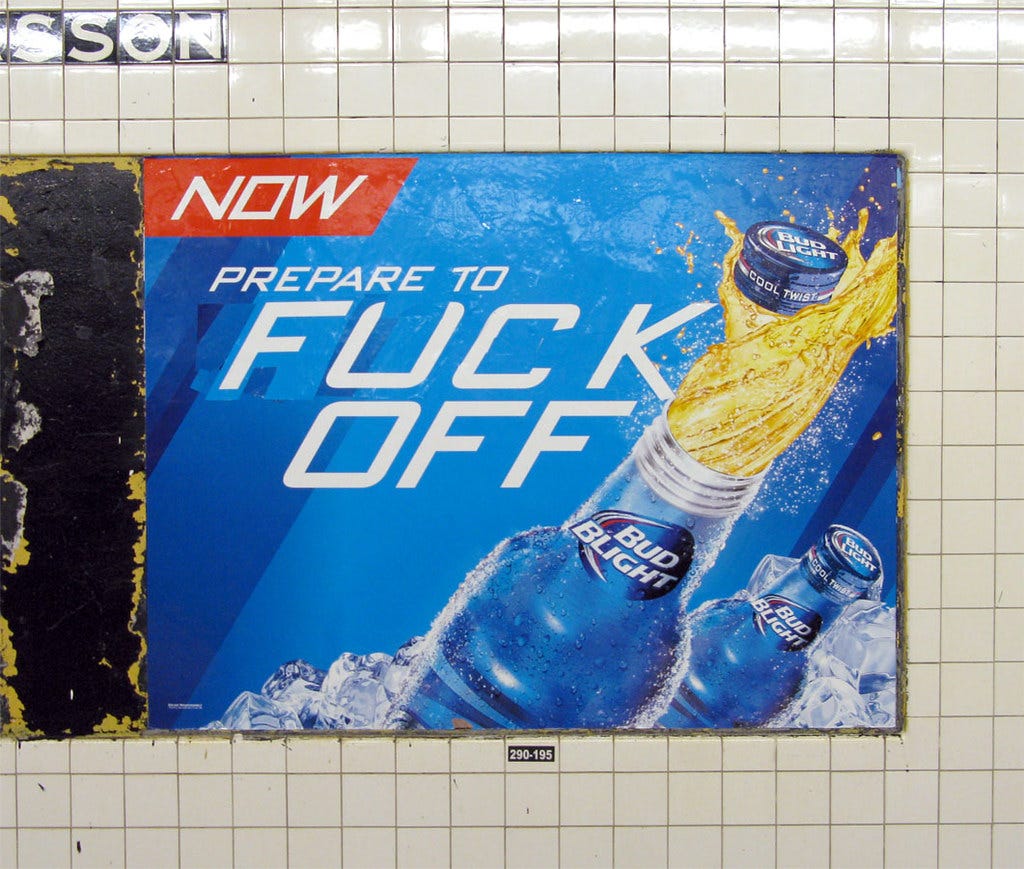It began with transgender TikTokker Dylan Mulvaney opening a can of Bud Light to advertise a sporting promotion. Not long after, rightwing rocker Kid Rock was firing a gun into a crate of said beer in protest. Then Anheuser-Busch started to distance itself from the influencer stunt, prompting gay bars to join the boycott. And now the CEO of parent company AB InBev has blamed the fiasco on social media misinformation.
I mean, Christ, it’s a low calorie beer. If you’re poisoning yourself, go for full fat1. Isn’t this America?
But oh god it is America. It’s inconceivable that backlash over an LGBT endorsement could have engulfed a British beer brand – if mostly because all the bestsellers here are from the continent. The French at least would have picked a better beverage to riot over. And probably the Australians would have been too busy putting a shrimp on the barbie to complain.

Yet while the story is a classic example of stupid America, it illustrates a problem that brands, companies, politicians and just about everyone flogging something faces right now: you can’t actually be inclusive.
It’s a bold claim given that inclusivity has been filed in the ‘sugar, spice and everything nice’ drawer of public discourse. Every organisation is expected to abide by it, to the point where job ads include it as boilerplate ahead of describing what they want to employ you to do.
That’s why a marketing bod from AB InBev showed no signs of nervousness in talking about moving away from the “fratty, out-of-touch humour” that the brand’s advertising has long hinged on. This was just days before Mulvaney was sent a bespoke can to mark the anniversary of her coming out as a trans woman.
“You’ve got to see people who reflect you in the work,” Bud Light marketing VP Alissa Heinerscheid said. Alas, the sales figures suggest many of the beer’s drinkers saw the opposite of them in her work, and ditched the brand accordingly.
Again, you can’t be inclusive. You can only pick who you exclude.
It seemed not to occur to Heinerscheid that at least some of Bud Light’s customers liked the brand’s sense of humour, which has been running through decades of TV ads. When she said it was out of touch, it should have prompted the question: “With who?”
Clearly the Mulvaney clip was out of touch with a significant portion of Bud Light’s customers. Some no doubt don’t like that she is a trans women, or LGBT culture in general. Some probably don’t want to be preached to. And maybe some accidentally drank a good beer and switched.
The problem for the kinds of people who like Bud’s old humour is that they are no longer a fashionable customer. The pink pound is sexier to corporates than the gammon pound, even though the latter is a larger group – perhaps especially in the beer market.
This isn’t to say that nobody outside of the stereotypical white straight male drinks Bud Light. Before this began, many thousands of trans people will have had it, if only because it’s a mainstream beer in America that lots of people drink.
In fact, find me any product and plenty of people will enjoy it who don’t fit the stereotype. Even newspapers, which are about as divisive a product as you can get, can’t convince all their readers to back their political candidates.
And I can see why Heinerscheid and Anheuser-Busch want to diversify their customer base. The marketing VP noted that Bud Light sales have been declining for some time, likely due to the changing demographics of America and shoppers changing tastes. Brands have to adapt.
What they don’t have to do is jettison their core consumer in the process. In fact, they probably shouldn’t do it.
Because just as rightwing papers are supposed to offend lefties, a beer geared towards straight male culture can’t be just as appealing to queer culture – just as a family pub can’t serve competitive drinkers, and a nightclub that’s jumpin’, jumpin’ can’t host a pub quiz.
Nothing is for everyone, in other words. And Bud Light doesn’t need to be for LGBT people, if only because many of them have suffered enough already. Better beers are available, and they won’t cause Kid Rock to shoot up another crate.
The Critic has been generous with the commissions of late. In April I wrote about how voter ID requirements aren’t the end of the world, and later this week there should be a piece published arguing against a public inquiry on Brexit. Depending on when you read this you’ll find the first or both here.
Despite my carping about low cal beers, I started this while drinking a table beer, which is akin to one of the soft drinks where they’ve cut half the sugar and replaced it with sweeteners. Still rotting your gums, but with half the taste.




You’ve also got to take into account the audience Dylan mulvaney has. It’s mostly teenagers. The bud light company chose to advertise to teenagers.